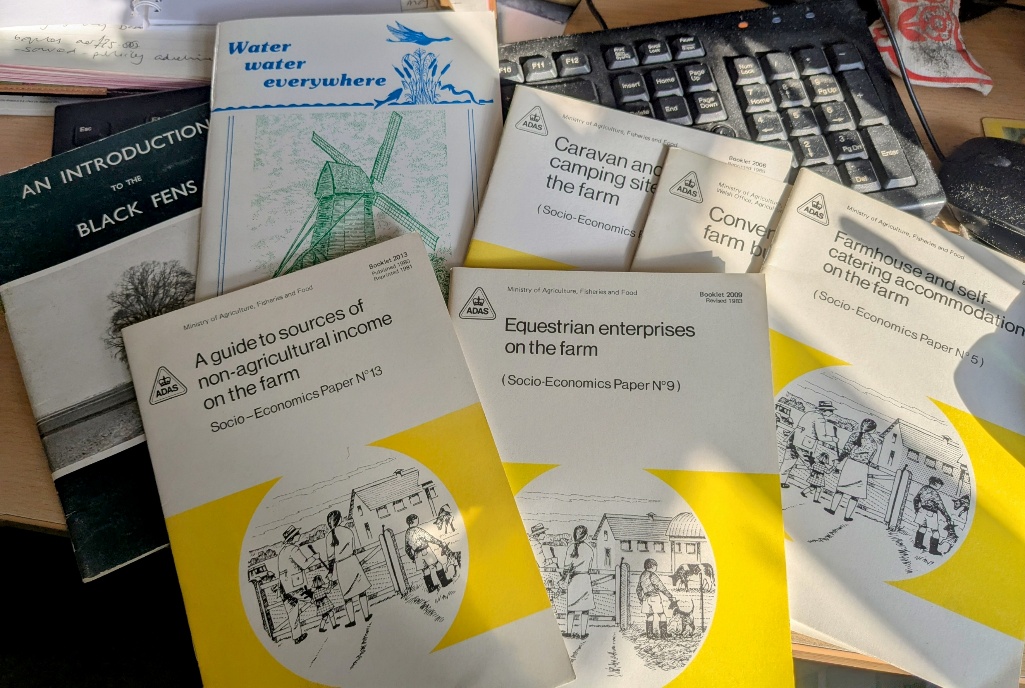What Goes Around Comes Around: Lessons from the Past in Rural Development

While searching for a document, I stumbled upon old pamphlets and reports from the 80’s and 90’s, covering topics including advice on farm diversification, water management, and small food businesses. These were not just dusty relics of the past; they were discussions on issues we are still grappling with today.
After more than 30 years in the rural development sector, working with landowners, policymakers, and agricultural businesses, I have seen incredible advancements—technical innovations, improved understanding of environmental sustainability, and more refined approaches to land and water management. Yet, at their core, the fundamental challenges remain the same.
Are We Progressing or Simply Relearning?
The rediscovery of these documents raised an uncomfortable question: Have we truly progressed, or are we simply rediscovering the same lessons every generation?
A senior colleague once advised me, “Always look in the file.” Over time, I’ve realised the wisdom in this: the answers we seek often exist in past reports and projects. Yet, we frequently revisit the same debates, relearning lessons already understood. For example, soil degradation was a key issue in the 1980s, just as it is today, though we now use terms such as regenerative agriculture and carbon sequestration. Similarly, the pamphlet Water, Water Everywhere might well have been written today. Water management challenges—flood risk, drainage, and conservation—remain central, even as climate change increases their urgency.
The Business of Farming: Old Challenges, New Terminology
Farm diversification has been encouraged since the early 1990s, with farmers urged to explore agri-tourism, direct to-consumer sales and reuse of seemingly redundant assets. Agri environment schemes were successfully introduced leading to many successes that appear the norm today. While opportunities have expanded, the core principle remains rural businesses thrive on adaptability.
Generational Cycles or Institutional Amnesia?
Why do these same themes resurface? Is it a case of each generation needing to learn afresh? Are we simply rebranding old ideas to fit new policy frameworks? Or is it a deeper issue of institutional memory—where knowledge is lost as personnel change, reports are shelved, and new initiatives fail to connect with past lessons?
It is, of course, natural for each generation to believe they are solving unique challenges. But for those of us who have worked across multiple policy shifts, there is a strong sense that while the context may change, the core issues remain remarkably persistent.
Moving Forward with Reflection
The challenge for policymakers, advisers, and rural businesses is not just to seek new solutions but to ensure we don’t lose sight of past lessons. The past holds valuable knowledge, often hidden in forgotten reports and archives. While innovation is essential, we must also foster a culture of institutional learning—building on what has come before rather than reinventing the wheel every decade. True progress lies in balancing new approaches with the wisdom of the past. As history shows time and again—what goes around comes around.
From 1985 to 2010, agri-environment programmes brought both learning and success, but also questions about why some outcomes stagnated. The 2010s saw a shift towards more transactional approaches, with less focus on long-term outcomes, highlighting the challenge of balancing administrative efficiency with the need for robust technical advice.
In 2020, the Farming and Countryside Programme (FCP) launched as a digital initiative with significant funding and an eight-year plan. It addressed many past issues, improving delivery through digital solutions. However, while the digital transformation succeeded, tensions between income support and environmental outcomes remained. The iterative nature of software development, though effective for technology, proved less suited to driving strategic change across the land-based sector.
Looking Ahead: Learning from the Past
The challenge is not just seeking new solutions but ensuring we don’t lose past lessons. Looking ahead, the key is to learn from the past while embracing innovation, ensuring that progress is both forward-looking and grounded in experience.
Reflecting on Political Change and Continuity
Political change often insists on ‘new’ approaches, even when existing schemes work well. If programmes such as LEADER had been maintained, we might be further ahead. Balancing innovation with continuity is key to avoiding institutional amnesia and building a sustainable future for rural development.

